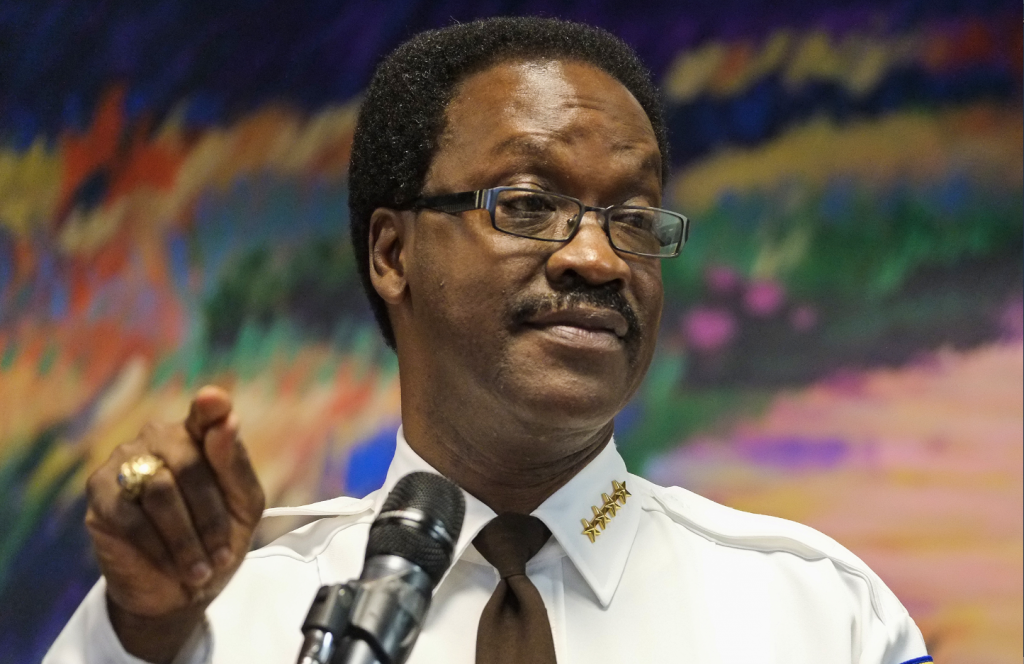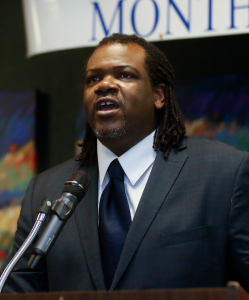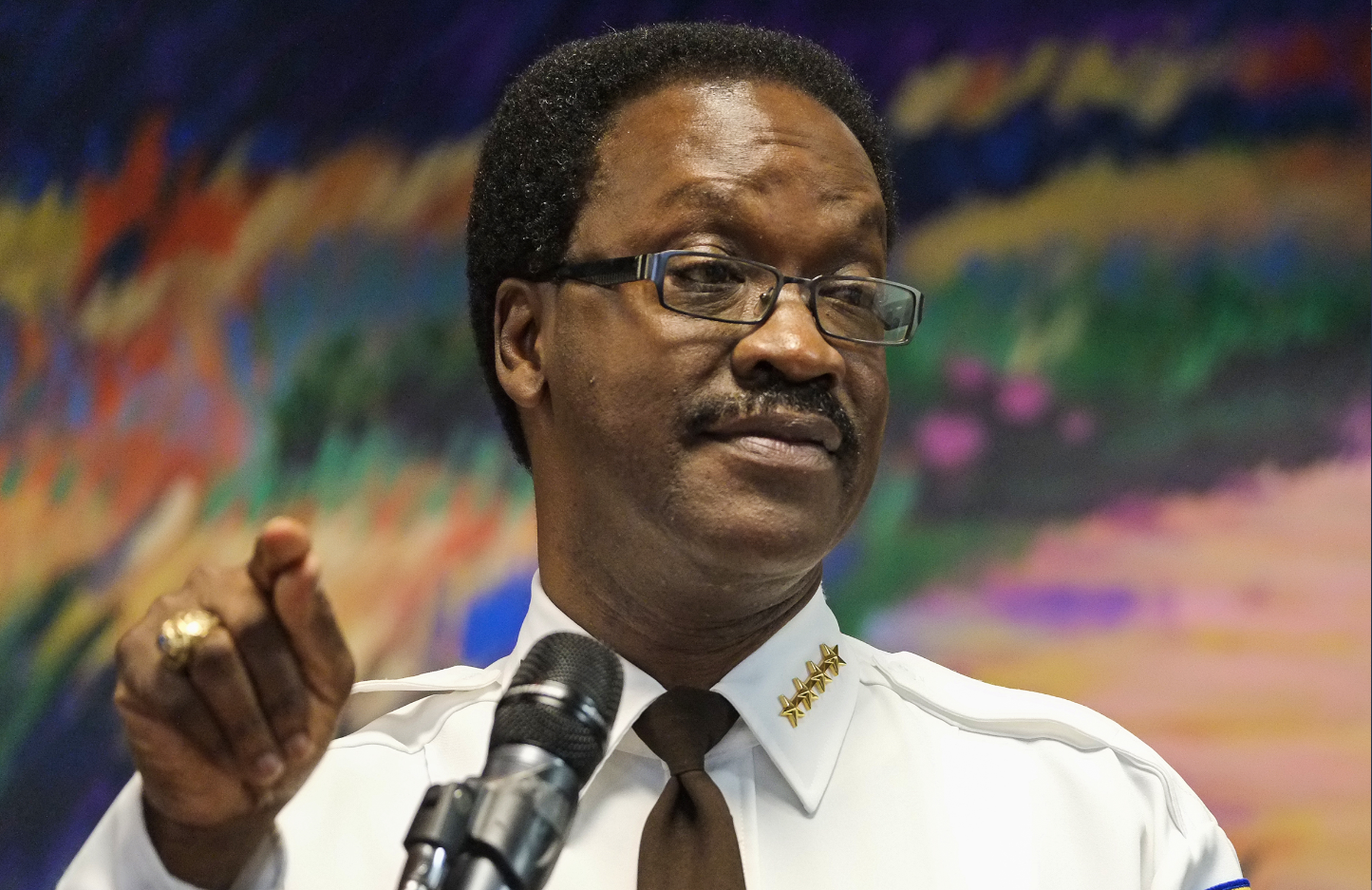
![]() While acknowledging he was a mischievous child growing up, Hinds County Sheriff Victor Mason praised the dedication of his public service counterparts in his keynote address at the 36th Annual Jackson State University School of Social Work Conference on Thursday.
While acknowledging he was a mischievous child growing up, Hinds County Sheriff Victor Mason praised the dedication of his public service counterparts in his keynote address at the 36th Annual Jackson State University School of Social Work Conference on Thursday.
During a luncheon at the Mississippi e-Center@JSU, he cited an example of his menacing behavior when he was about 4 years old while sitting in church.
“I was bad. I was something else. I just didn’t get caught.”
His luck eventually ran out, however.
[dropcap]”O[/dropcap]NE day the pastor kept going on and on and on. And little boys like me get restless.” He heard his mother tell her adult friend during a sermon that the pastor was being too long-winded. “So, after benediction when the pastor was at the back door shaking everybody’s hand … he greeted me and said, ‘Hi, boy! How’re you doing?’ I said, ‘Preacher, I’m doing fine, but my mother said, ‘You sure talked a long time today.’ So, my mother beat me when I got home,” said Mason, a JSU alum and graduate of Callaway High School. “I know what wood feels like.”
He told social workers that the only difference between his job is that “I have a pistol, and you have a notebook.”
Visiting associate professor Dr. Isiah Marshall in the JSU School of Social Work said he appreciates the collaboration with law enforcement and says the future of social work in Mississippi is very bright despite challenges.
Marshall, who will assume the role of associate dean in July, said, “We need to make sure students are equipped to handle issues and cope with inadequate staffing of child welfare workers. We also must provide early intervention with families and allow individuals to make better decisions before they end up in the child welfare system or juvenile justice system.”

He said the overarching issue in our society is the breakdown of families.
“We need to be about the village raising the child. If that young person is not in a good situation, someone in that community must be willing to help make a lasting impression in his or her life,” he said.
Bernice McKenny, a JSU instructor in the bachelor of social work program, said this month’s celebration and theme, “Forging Solutions Out of Challenges,” provide an opportunity for colleagues to network and share ideas.
She said, “We have so many young people in trouble, and we need to help them trust us. By working together with law enforcement, it shows a united front.” She said the collaboration between officers and social workers in the past has been sporadic, but it is improving.
“We have social workers who are mitigation specialists assisting young men, for example, on Death Row.” She said we try to figure out whether environment may have led to their troubles. There are situations, too, when parents accept money from children selling drugs. “We try to talk to moms and tell them there’s a better way. … Overall, I really want people to have more respect for social workers.” We do more than just remove babies from dysfunctional families, McKenny said.
[dropcap]M[/dropcap]EANWHILE, Mason said he knew what he wanted to do at any early age because of positive role models in his life while growing up.
During his childhood, he said, “We didn’t have HBO. We had CBS, NBC, ABC. That was it. … We had rules such as returning to the house when the (street) lights come on. … If you dropped a piece of paper, you knew to pick it up. You didn’t say, ‘Let the wind get it. I don’t have time.’ … You always said, ‘Yes, ma’am … or Yes, sir.’ … And you didn’t have to tell me to pull up my pants,” Mason said.
In contrast, today’s generation is strikingly different, he bemoaned. Although his job is stressful, Mason told social workers they, too, have tough jobs.
He recounted his dismay in dealing with too many youthful offenders.
“This generation has been taught by the government that it can’t be spanked.” He even recalled one of his sons telling him that if he whipped him he would call the police – a threat that left Mason undeterred as a disciplinarian.
“The downside of my job is when I have 16 youthful offenders in Raymond (Detention Center).” He said one of those, an unapologetic suspect at age 19, has been indicted on a federal capital murder charge. Mason asked the alleged offender if he knew the difference between state and federal time. Boastfully, the accused told Mason that he was merely going to a place that’s “like a picnic.”
Debunking that myth, Mason was quick to point out to the audience that if a person gets 50 years in federal prison, for example, at least 49 years would have be served. “You’re not (getting out early) on good behavior,” he warned.
In another case, Mason said a juvenile robbed a victim at gunpoint simply because his mother told him she didn’t have money to give him.
[dropcap]T[/dropcap]O help social workers deal with violators and behavioral issues, the sheriff assured them that his department would provide support.
“I know it’s tough out there,” he told them, recalling a recent incident in which three inmates escaped. “The temperature was right at 70-something degrees; the wind was barely blowing; and the guard said they told him they just had to use the restroom.”
Mason said the guard failed to prevent the escape once they began walking or running away. After asking a fourth inmate sitting in a truck why he didn’t run, the inmate said, “I’m getting out tomorrow. I’m not crazy.”
In a strange twist of events, the sheriff said that when the first escapee was recaptured and returned to his self-described “Mason Inn” detention center “where we leave the lights on for you” the former fugitive explained why he escaped: “When I got out of the truck I started running. I stopped and then started crying. But the devil made me start running again.” Disturbingly, before the escape, the offender had only 24 days remaining in jail before his official release. Now, he’s facing from one to five additional years.
Mason said the second escapee had found out that his mother in Memphis had a heart attack. So, he went there to visit her. Ultimately, he was returned to jail.
The third one was “just sitting on a porch waiting on us to come get him. When we got there “one officer said he waved, and the escapee just waved back” ready to be picked up, Mason said.
As a JSU criminal justice major, Mason said these stories illustrate the important jobs of social workers amid dismal statistics that show 4,700 men on lockdown in the Parchman correctional facility. “I have classmates and relatives there,” he said.
[dropcap]B[/dropcap]EMOANING the recent killings of six people in five days in the Jackson area, he told social workers “we must do something because it makes you ask the question of who’ll be the next victim.”
Mason urged an all-out assault against violent behavior. “This entire new generation has a pistol” when just having a pocketknife during his era was considered a cardinal sin, he said.
With a steady rise in erratic behaviors, Marshall said, “It’s a great time for social workers to get continuing education on emerging topics from traumatic stress of veterans to child welfare issues. One of the most important things is for the School of Social Work to form more collaborative relationships with entities such as law enforcement in this area,” he said.
Meanwhile, the sheriff, who has implemented a “Scared Straight” program to change deviant behavior, said such issues are not just relegated to males but that girls, too, can be problematic. He said mothers today are as young as ninth-graders, with some grandmothers ranging in ages from 20s to 30s.
Mason said the moral and spiritual compass of society has eroded.
“When they took prayer out of schools they let the devil in … and, sadly, although we have more churches we also have more jails,” he said.









